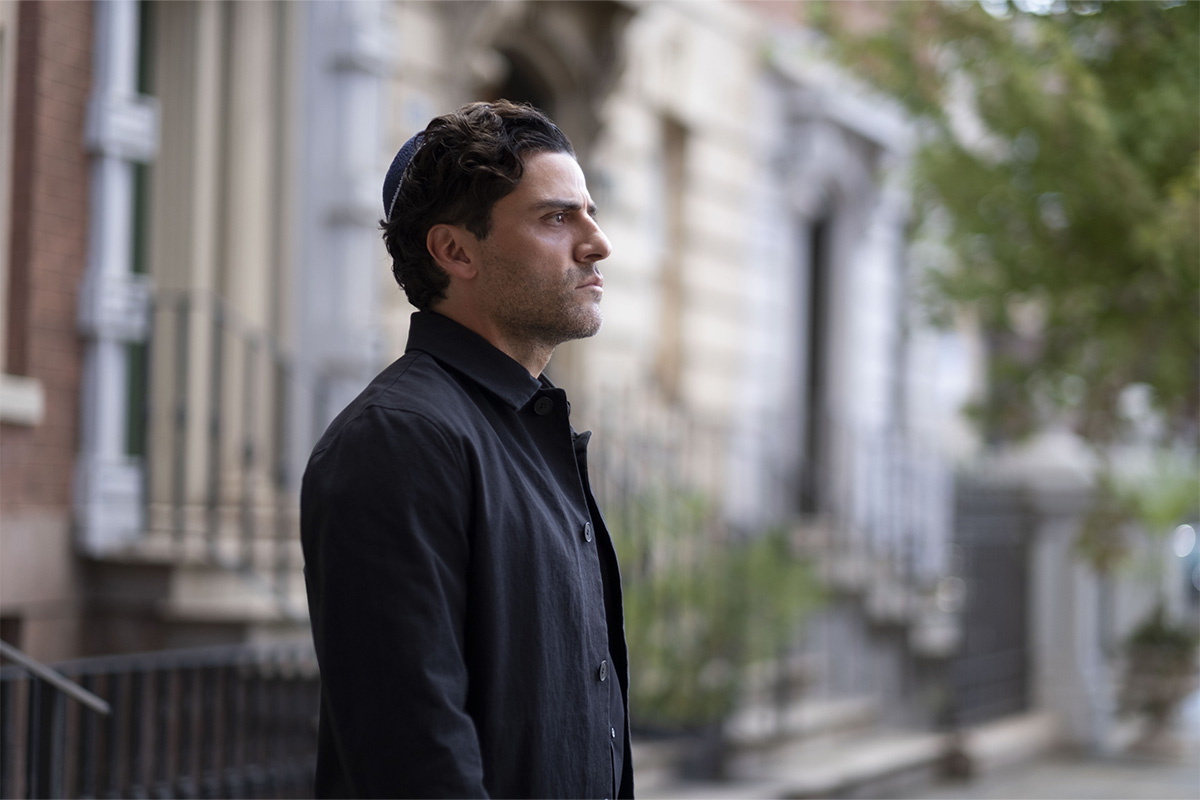When “Moon Knight” premiered on Disney+ at the end of March, Jewish Marvel fans eagerly watched to see whether we would finally get a Jewish superhero in the MCU — or if that part of his story would go unacknowledged like so many superheroes before. Oscar Isaac was cast in the lead role, and while he does have Jewish ancestry, he was raised Christian, so it was unclear in which direction the show would go.
So we waited — and got a brief glimpse at a Star of David necklace in episode two — and waited some more until this week, in the fifth of the six-episode season, when we finally got some answers and Jewish content.
Marc Spector is the avatar for the Egyptian god Khonshu, god of the moon and vengeance, and that’s where his powers come from as he acts out Khonshu’s retribution. In the TV show, Marc Spector also has at least one other identity (that we know of so far), Steven Grant, who is British and works at a museum gift shop. The first few episodes of the series are from Steven’s perspective, so the audience slowly learns about Marc and Khonshu as Steven does. Episode five, “Asylum,” reveals that Marc created the personality of Steven to help him deal with his mother’s abuse. It is through this backstory that we also get more glimpses into Marc’s Jewish background.
Marc’s younger brother died drowning in a cave when they were children and Marc’s mother always blamed him for his brother’s death, since it was his idea to go to the cave in the rain. In a flashback, she yells at Marc during his brother’s shiva. It’s not explained that it is a shiva, but it is immediately obvious to anyone who has been to one thanks to the kippahs, tallits, prayer books, folding chairs and black clothes. While it’s a brief scene that doesn’t shed too much light on Marc’s relationship with Judaism, the shiva is shown as something normal that happens without having to explain it to non-Jewish viewers, and that’s a good thing. After all, we wouldn’t need any additional information if it was a Christian funeral being shown.
Later in the episode, Marc tells Steven that their mother died two months prior and explains that his dad called about the shiva. This time the word “shiva” is actually said, but again not explained. A flashback shows Marc outside the house he grew up in, struggling to go in for the shiva, and then throwing his kippah on the ground. This scene led to some social media backlash because a kippah should never touch the ground, but that doesn’t necessarily mean this was a mistake on the part of the writers. On the contrary, such an act shows how devastated he was in the moment, grieving, but not physically able to bring himself to go inside, and his release was throwing his kippah to the ground. He then clutches it to his heart, as if to show that he knew it was wrong. The moment is also significant because Steven then takes over — and that’s when Steven and Marc’s lives start bleeding into each other, which leads into the events of the series.
And… that’s all we get so far.
There are a lot of unanswered questions. Is Marc’s father a rabbi, as in the comics? Does Marc still practice Judaism? Has he dealt with antisemitism? Considering there is only one episode left of the series and a lot to wrap up, it’s doubtful all these questions will be addressed. But because this is Marvel, the character of Marc Spector is sure to be back in some capacity, either in another season of “Moon Knight” or in films with other characters. The other MCU TV series created for Disney+ — “WandaVision,” “The Falcon and the Winter Soldier,” “Loki” and “Hawkeye” — focused on already established characters from the films. But “Moon Knight” is a completely new character to the screen, so this series has to do all the introductory work. Once the world is established, there is more room for nuance. For now, it’s a start to know that the character is Jewish and that part of his identity was not erased on the move from the page to the screen.
In the past, Jewish Marvel fans could turn to Magneto, who is Jewish in the comics as well as in the X-Men movies, but those films are separate from the MCU. It’s also telling that he is a Holocaust survivor. Are our stories only worth including when they relate to the Holocaust? (In the comics, Marc Spector’s father is also a Holocaust survivor.) Wanda Maximoff is Jewish (and Magneto’s daughter) in the comics, which was disappointingly left out of the Marvel films and “WandaVision.”
But the tide might be turning. We may even get a Jewish female superhero that we weren’t expecting. Kate Bishop in “Hawkeye” isn’t Jewish in the comics, but in the TV show, she stays in her aunt’s apartment and there are clear shots of a menorah and a mezuzah, so Kate Bishop must have some Jewish roots, though it’s not addressed beyond that. Since most comic creators were Jewish, you can basically make a case that any superhero is coded Jewish (Captain America literally fights Nazis), but that’s not the same as having characters who are visibly Jewish.
For now, let’s give Marvel the benefit of the doubt that they will expand on these teases of Jewish representation while also keeping a critical eye on where they go from here.



